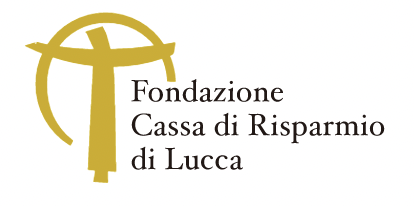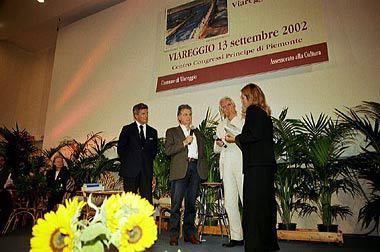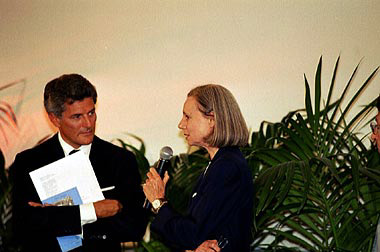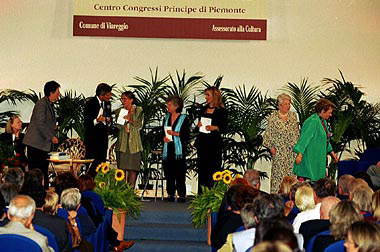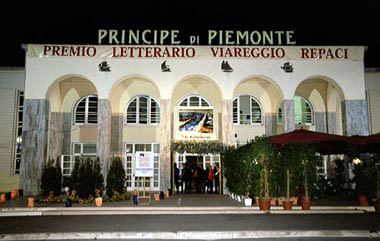
The Literary Award Viareggio-Rèpaci is one of the most prestigious literary awards in Italy. It is a society and literary event boasting a long and glorious history. Today the award carries the name of its founder, Leonida Rèpaci, an important figure in 20th century Italian culture. He was the president of the foundation until he died in 1985, excluding a brief period when he was expelled given his opposition to the fascist regime.
The panel give a prize to an entry from each of the three sections in the contest: narrative, essay writing and poetry. In 1965, an additional award was added along side the Viareggio-Rèpaci one. It was called the International Award Viareggio-Versilia and is given to “world famous personalities who have given their lives to culture, understanding between different populations, social progress and peace” each year.
The five finalists for each section of the 2004 edition are:
FICTION:
Edoardo Albinati, Svenimenti, Einaudi; Giorgio Dell’Arti, Coro degli assassini e dei morti ammazzati, Marsilio; Marina Jarre, Ritorno in Lettonia, Einaudi; Elena Loewenthal, Attese, Bompiani; Piero Meldini, La falce dell’ultimo quarto, Mondadori.
POETRY:
Ivano Ferrari, Il macello, Einaudi; Livia Livi, Antifona, Aragno; Maria Marchesi, L’occhio dell’ala, Lepisma; Elena Salibra, Vers.es, Diabasis; Francesco Scarabicchi, L’esperienza della neve, Donzelli.
ESSAYS:
Edmondo Berselli, Post italiani, Mondadori; Nadia Fusini, I volti dell’amore, Mondadori; Amedeo Quondam, Cavallo e cavaliere, Donzelli; Andrea Tagliapietra, La virtù crudele, Einaudi; Eugenio Turri, Il paesaggio e il silenzio, Marsilio. The Award came about in 1929 under the initiative of Leonida Rèpaci, Carlo Salsa and Alberto Colantuoni. The Versilia, in addition to being a refined, high society summer location, was in that period, a very lively cultural centre which was frequented by writers, actors and painters. In its first years of existence, the event acted as a meeting place for artists in favour of the regime such as Luigi Pirandello, and active antifascists such as the founder, who collaborated in L’Ordine Nuovo and L’Unità.
This event was suspended during the war and started running again in 1946. The year after “Lettere dal carcere” by Antonio Gramsci won the award. This was seen as a very provocative choice and instigated controversy amongst scholars. After the death of Répaci, this event was directed by Natalino Sapegno then consequently by Rosario Villari and Cesare Garboli. Anselmo Bucci with “Il pittore volante” was the first winner in 1930. Important figures from 20th century Italian and Tuscan literature have participated in this event such as Pea, Viani, Saba, Palazzeschi, Morante, Calvino, Moravia, Primo Levi to name but a few. Cesare Garboli, president of the award till his death in april 2004, won the prize with an essay in 1969. Recently young writers as Maggiani and Ammanniti won the prize for the narrative section.
Evenings with finalist authors (at 21.30):
17 July at Bagno Imperia
24 July at Bagno Leda
31 July at Bagno Principe di Piemonte
7 August at Bagno Avvenire
21 August at Bagno Firenze Renata Discacciati
Ufficio stampa 02 6551444
Segreteria letteraria Gabriella Sobrino via Pandolfo I n° 5 00162 Roma
Ufficio Cultura Comune di Viareggio
Marcella Malfatti 0584 966728
http://www.comune.viareggio.lu.it/arepaci.html literature Premio Letterario Viareggio Répaci Viareggio Town Council undefined
Gallery:
Details:
by car A11/12 motorway exit Viareggio.
busses and trains from Lucca
Viareggio Town Council
The Award came about in 1929 under the initiative of Leonida Rèpaci, Carlo Salsa and Alberto Colantuoni. The Versilia, in addition to being a refined, high society summer location, was in that period, a very lively cultural centre which was frequented by writers, actors and painters. In its first years of existence, the event acted as a meeting place for artists in favour of the regime such as Luigi Pirandello, and active antifascists such as the founder, who collaborated in L’Ordine Nuovo and L’Unità.
This event was suspended during the war and started running again in 1946. The year after “Lettere dal carcere” by Antonio Gramsci won the award. This was seen as a very provocative choice and instigated controversy amongst scholars. After the death of Répaci, this event was directed by Natalino Sapegno then consequently by Rosario Villari and Cesare Garboli. Anselmo Bucci with “Il pittore volante” was the first winner in 1930. Important figures from 20th century Italian and Tuscan literature have participated in this event such as Pea, Viani, Saba, Palazzeschi, Morante, Calvino, Moravia, Primo Levi to name but a few. Cesare Garboli, president of the award till his death in april 2004, won the prize with an essay in 1969. Recently young writers as Maggiani and Ammanniti won the prize for the narrative section.


